I was channel surfing the other day and stumbled upon a Dogs 101 episode with Shiba Inus. They characterized Shiba Inus as “one of the most difficult breeds to train”.
- Why is a Shiba Inu difficult to train?
- What makes a Shiba Inu more difficult to train than other dog breeds?
Of course a Shiba is stubborn and strong-willed, but then so are many other breeds, including the Siberian Husky. Why then are Shibas more challenging to train than other strong-willed breeds?

1. A Shiba Will Do What a Shiba Wants
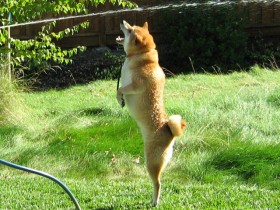
A Shiba Inu will only respond to activities that makes sense to him, and not necessarily to you. The good news is a Shiba is not shy about letting you know what he likes, and what he wants!
Shiba owners usually listen carefully to their dogs, and personalize training methods to suit individual preferences and temperaments.
Shibas also think for themselves, and are very motivated to come up with alternate ways to reach their goals. As a result, training a Shiba Inu is often counter-intuitive, and traditional dog training methods may not work well.
Shiba owners must be creative and flexible.
A Shiba may follow commands if they make sense to him. Other times, he will do something else that ROCKS!

Some people may reason that since Shiba Inus are independent thinkers, they would respond better to aversive training techniques, such as collar corrections or alpha rolls.
This is false.
Shiba Inus are also extremely strong-willed and stubborn. They will fight back if they feel threatened. I started with aversive training techniques, and my Shiba Sephy fought me every step of the way. The more a dog practices fighting back, the more likely he will repeat that behavior and develop aggression issues down the road. Sephy was surely heading that way, which was why I started looking into alternative training methods.
Aversive techniques also made Sephy lose trust in me.
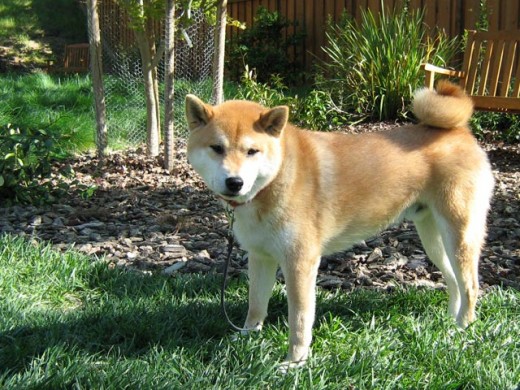
2. A Shiba Inu Will Not Surrender Even When All Is Lost
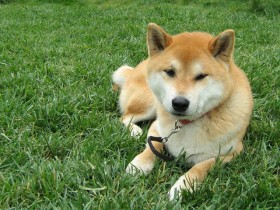
All dogs think for themselves. They have their own needs, which may not always coincide with ours.
Strong-willed dogs are not afraid to push their own agenda, even if it puts them in conflict with us and other dogs.
However, even strong-willed breeds like the Siberian Husky will give up the ghost when they see that the effort and time involved, is not worth the end result.
On the other hand, Shiba Inus have a very …
singular state of mind.
~~[ Geoge ]

Once a Shiba starts to focus on something, he may quickly become obsessed. When in that singular state of mind, it is difficult to distract Shiba and get him to do something else.
When Sephy gets into that obsessive state, he will not give up no matter what. Even if things look hopeless, he will not surrender. The more I try to force him to comply, the more he will dig in his paws and not budge.
For Shiba Inu Sephy, giving-up is simply not an option.
It seems that any kind of concession will deal such a grievous blow to his Shiba pride that he is willing to do whatever it takes to protect it. Sephy is willing to endure pain, not eating, not going for his walks, not getting affection or attention, losing his freedom, and much more; when his Shiba Honor is on the line.
This great quote from the I am Shiba blog sums it up very well
I Am Shiba. Seppuku will not be enough.
The best way of getting Sephy to do something is not to make it into a challenge or a fight. If Sephy does not want me to brush his teeth, he does not get his usual melted cheese and chicken meal. I will simply go back to my tasks, and when I am free, I try again. By then, he is usually hungry and in a different state of mind.
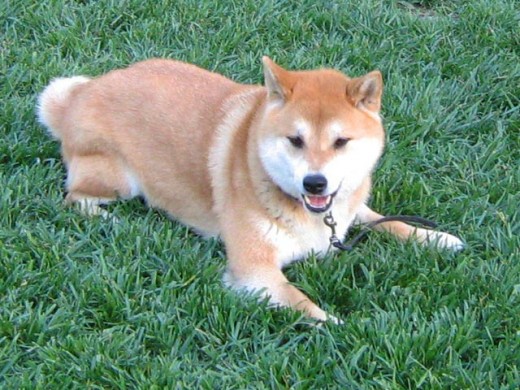
3. A Shiba Inu Has the Heart of a Rebel

Shiba Inus are often characterized as independent, aloof, and more like a cat.
I think that Shibas are independent minded, but they actually want and enjoy a fair bit of human attention; perhaps more so than many other dog breeds.
Unlike other dogs however, Shibas are not necessarily looking for positive attention. With Sephy, any type of attention will do; as long as it is big, all-eyes-on-Shiba, high quality attention.
Negative human attention is easier to obtain, more intense, and usually lasts for a longer duration.
As such, this is the type of attention that Shiba Sephy usually strives for, not unlike an online troll. If he is able to get my goat, he will. If he is able to get my goat and start a fun chasing game, that is even better!
If I tell Sephy not to do something, he will definitely try to do it the first chance he gets. He is sneaky and will do it when my back is turned. However, if I am not home, he spends most of his time sleeping because he does not have an audience.
The “game” is only fun when there is a real danger of being caught, and the possibility of escape. An audience is also necessary to see his God-like Shiba-ness.
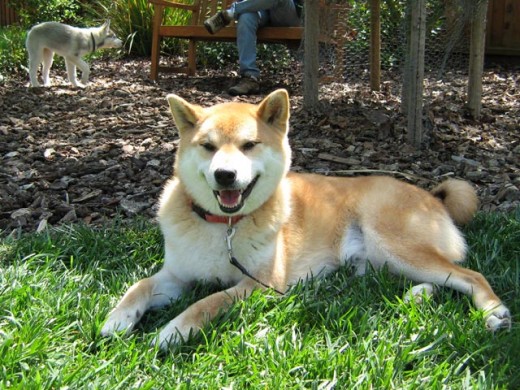
I have since learned that one of the best ways to deal with Shiba-hijinks is to stay above the fray and ignore my attention-seeking Shiba. Sephy does not like being ignored. He will go to great lengths to get the attention of those that seem disinterested in him – even if it means following commands!
What to you think?
- Are Shiba Inus one of the most difficult breeds to train?
- What makes a Shiba Inu difficult to train?
- Which dog breeds, do you think, are more difficult to train than a Shiba?
Many thanks to Kblover & Wally, Brett & Ziva, Andrea & Kiba, Zuko’s Mom & Zuko, Geoge & Rusty, as well as Jess & Zeus, for sharing their Shiba Inu stories and many dog experiences. I made many changes to the article above based on their comments.
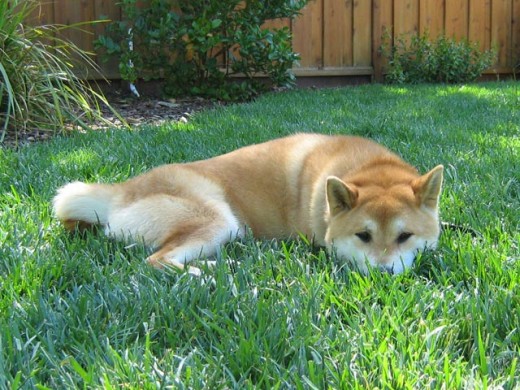
I brought month home a 6 month old male 2 months ago. He originally just seemed shy and I attributed that to his new environment. He allowed me to interact with him somewhat, but was not trusting me easily. It has taken me 2 months of constant unwavering love and patience to get him to understand that I will not hurt him. I am talking keeping the dog with me 24 hours a day except for short periods of time necessary to attend to appointments and personal issues. When he wanted to play, we played, etc. This, all necessary to help him learn that I was trustworthy. He refused to play with other members of the family. He is only now, after 2 months of their trying, beginning to also play with them. He now is beginning to let other’s pet him. He is just recently coming out of his shell enough to go all out playing with other dogs. Playing with other dogs, I believe, will be a key element in his further socialization advancement.
I did a few tests to determine to my satisfaction that he had not been abused, but just what I determined was a total lack of human socialization by the breeder. He would not allow me to pet him for quite some time. I had to introduce petting into a game of fetch whereby I would throw his toy after I got to pet him. This has worked and he now seems to welcome my pets. I am not now convinced that it was a lack of socialization by breeder, but possibly a combination of breed trait and lack of socialization efforts given that they had him until he was 6 month old and I do believe that he should have been more accepting of human touch. I have not purchased from a breeder previously though, but growing up with dogs and puppies, I would never for the life of me imagine not acclimating puppies to human touch from their earliest days. To me, it just doesn’t make sense. It makes even more sense to handle and love on them if they are in any way prone to socialization difficulties. Am I wrong here?
It also took time before he even wanted to go for walks. He would refuse and I would have to pick him up and take him outside. I attributed this to his being afraid of EVERYTHING. It has taken me these two months to get him to understand that going for a walk is something that he would enjoy and he now understands that and asks to go for walks.
My point in posting this is…. Are all Shiba Inu’s this difficult to socialize? If so, I wonder at the plight of most of them. Not everyone is willing to just drop the rest of their life and devote themselves to ensuring that their puppy is given the love, patience and time needed to ensure that they become a well adjusted dog. What about the ones who don’t receive this care? What about the ones who are sold to people who will in no way give them this attention? I worry about them living a life of fear or worse.
I am in no way trying to say that I think the Shiba Inu breed should be shied away from. I just think that people should know what they are getting in to and be prepared to devote the necessary time and energy into socializing their puppy. Mine is now very loving to me, which I neglected to state and should have. He is coming out of his shell and showing a wonderful, playful personality and an exceptional intelligence. He has been well worth my efforts, but I wanted to state that the effort needs to be taken to achieve results.
We have three Shibas and the first one was already 14 weeks old when we got him. The other two were 8 and 9 weeks. The oldest was the most difficult to get socialized plus we were so cautious in dog parks because Shibas can be dog aggressive. He got into a few scuffles, but he soon learned. Although the oldest is now the best trained, they all went thru the. 8-week puppy course at a pet store, and they are so cute and have fun together. My biggest issue is that the youngest is 19 months old and still loves to chew on everything. I have to keep him supplied with chewies and toys . They are all males, fixed, related and four months apart between first two and two years between last two. Bottom line– I live my Shibas!
Emily
Interesting reading, both the blog and the comments!
Our Shiba Ako is a 4 year old male, and most of the things we’ve taught him, he learned within the first year. Not that he isn’t learning anymore (he just learned to get along with a goat), but the introduction of new things and commands are less frequent.
I think what has surprised me the most, is how much he pays attention to body language. The nuances we ignore are obvious to him. I noticed early he’d hesitate to do something on verbal cue if my body language told him differently. If I didn’t face him, or if I told him to sit while I was doing something else with my hands, it was a completely different command to him. He wasn’t being stubborn or trying to get away with it. Since he was so attentive to small things, we started to use both signs and verbal commands for things like sit, lie down, go away, shake, spin and roll, just to see if we could. He obeys handsigns as much as words.
We use the dog for tracking/hunting as well, but in order not to confuse “Search!” (for blood trail/animal scent) with seeking for treats I’ve hidden somewhere in the house or outdoors, I just look at him and sniff and he runs off sniffing out treats with great enthusiasm.
It seems to me that he is less flexible with people’s body language and appearance than other breeds (or individuals, I don’t know). As a puppy, he’d bark at people wearing sunglasses, or if they leaned over him. Only a few times have I experienced him not barking, but showing complete trust in total strangers at first meeting on a walk. He seems to have a radar for insecurity and aggression and take no chances, but keeps his distance or growls at them if they insist on “getting along” with him. Friendly, non-threatening people are quickly accepted. Our English Setter is so cuddly (needy?) he’d ignore anything for a human touch.
Ako is generally not good with other non-neutered dogs, and gets pretty hysterical at the vet, but we are very happy he lets us tend to wounds in the home environment with little or no fuss at all. Nail clipping, tooth brushing and brushing when shedding goes well. Having his teeth checked by a judge (stranger) in the ring, not so much. We were expelled 😛
Praise to the breeder that had him house trained by the time we picked him up at 8 weeks, and that she taught him the meaning of “NO!” (=Abort mission!) It has saved teddy bears that weren’t his, chicken, hens, cats, dinners, plants, shoes, and also animal skins meant for decorational purposes.
Thanks for sharing Ako’s story with us. He sounds absolutely adorable and very Shiba! 😛
Hey, my shiba is 2 years old and he fits all the description that ever was produced about the breed. Still his character is well balanced, he is not agressive unless forced to defend himself, very loving and dedicated. He protects the household and warns me on our walks especially when it gets dark that a stranger is approaching. But I have one huge problem with him. He doesnt listen to me when he is let loose. I mean he doesnt come up to me when called his name. It was different when he was still a puppy. It changed when he grw up – now being two years old. So when we go for a long walk in the hills he will always move around and keep an eye on me but when called will never come to me unless fooled by some trick. For example he chases me when I hold his ball and then when he comes close enough I grab him by his collar. But sometimes he senses that I want to grab him and he wont even come up for his favorite toy. Food doesnt work either. When he plays in the garden he seems unhappy when I dont watch him. So catching him is reletively easy. The situation gets tense when we go outdoors. Once he roamed free all night long and I found him at tge doorstep at 6 AM in the morning. Cold, trembling, hungy (it was winter) but happy and finally ready to go home. I envy people who walk their dogs not using leashes. They just follow owners. is it possible at all with shiba? Is it still not too late to teach him to come to me when called? Is there any method? My friend had his shiba trained by professionals and it didnt work eaither. Sometimes I just think there’s no way to change it. What would you advise? Thanks and all my best to all shiba and husky owners all around the world 🙂
This ASPCA article has a nice list of recall training techniques-
http://www.aspca.org/pet-care/virtual-pet-behaviorist/dog-behavior/teaching-your-dog-come-when-called
In general, Shibas are not to be trusted off-leash because of their independent nature, stubbornness, and high prey drive. There are exceptions, of course, but I do not usually let Sephy off-leash, unless we are in a fully enclosed space.
Off-leash stories from other Shiba owners-
http://www.shibainuforum.org/forum/discussion/8052/shibas-off-leash-fact-or-fiction/p1
http://lokitheshiba.blogspot.com/2010/12/shibas-off-leash.html
http://www.meetup.com/www-seattleshibainu-com/boards/thread/3770921/10/
I have a female shiba inu who has just turned 10 and I’ve owned her since she was 8 weeks old. With a bit of patience I taught her word association and simple commands like “sit”, “come”, and “kennel” to name a few. She was house trained in less than two weeks after getting her and very rarely has an accident in the house. She’s very smart and like your article says won’t do anything that doesn’t make sense to her. Forget trying to play fetch! She is stubborn and highly sensitive, but very loving and affectionate. After a day at work she greets me at the door and typically follows me around the house or lays in the yard sunbathing. It has been a joy to have her and I don’t really see myself owning another breed. Not your typical dog, but very much worth it to the right owner.
I agree, tojo very loving, only problem wont let nobody in my house. I need help
I have a Shiba/American Akita mix, and I’ll be honest, he isn’t the brightest crayon in the box. I think it’s the AA in him, it’s diluted his Shiba brilliance. He lives for food and nothing else.
So far we’ve managed to train him to Sit, Down, Wait and Roll Over. Even though he knows Wait (he waits for his dinner every night) we’re having the hardest time teaching him to Stay. Did I mention he’s one and a half, but that’s all we’ve managed to teach him?
He is pretty stubborn, and he likes new people a lot less than my GSD who loves everyone he meets. He isn’t as much as a lap dog as the GSD either, but he does come and lay down at your feet in a companionable fashion, and come and sit by you and give you meaningful looks for chest scratches (where the GSD hops on your knee and settles down.)
He’s pretty well behaved when it comes to the furniture, actually. For some reason he doesn’t get up on the couch or chairs, although he will hop on the beds. He does need constant reminding not to go in the kitchen though. Both dogs do. They have a terrible urge to go in there all the time, even though there’s usually nothing of interest in there.
He doesn’t do all of the Shiba noises. He doesn’t make the Shiba shriek, thank goodness. He has a Shiba bark though, not an Akita one, which sounds very funny as he’s actually quite a large dog. And he can howl and growl, but that’s it for vocalisations from him.
I will admit that he is a difficult dog to train though. He’s a lot harder to work with than the shepherd, that’s for certain.
We just took in a supposively Shiba pup. His breed is unknown due to the fact that his mother looks like a terrier but the father is unknown. He may be mixed because he takes on the the features of a Shiba dog more then any other dog. He was born on a Japanese farm. He is now about 9 weeks old. When I first met him he was really shy and to himself trying to find a spot to hide while his brother was the total opposite, barking and running around and just all over the place. So far he has been good about letting us know that he has to go outside to do his business. We let him free out in our backyard where there is no fencing. I noticed he does really good just by sticking around our yard area and only walks out to the other neighbors yards to do his business and then comes right back to our part of the yard to wonder around. The only trick he knows so far is to shake. When we open up the gate that keeps him in his spot which is in the laundry room he knows to go in. He also sleeps better and stays quiet most of the night in my bathroom. Lately he has been more playful. He has been liking to bite on his pee pads which he never pees on he just usually sleeps on it if he hasn’t chewed up. i’ve had to make sure our slippers and shoes are put up or away when he is out to roam free around the house. I caught him recently chewing up my son’s chin guards. =/. Also he would try playing with my legs and then tries to bite my feet. good thing his bites don’t hurt but I’m not liking the fact that he thinks biting human’s is ok for play time. I’m looking for the best way to teach him and to let him know that biting feet and hands are not ok. I’m still trying to read through this blog so hopefully i can find something that will truly work for him.
Congratulations on your new puppy!
This is what I do to train my puppy not to bite on people-
http://shibashake.com/dog/how-i-trained-my-husky-puppy#bite-training
I also do bite inhibition training with my dogs to teach them to control the force of their bites, especially when interacting with people.
Here are a few more things that I do with my dogs.
Why do you keep him in the laundry room and bathroom?
my shiba only listens well if i have food with me.
and whenever he sees a door open he’s gone and he’s not coming back ,and when i try to call him back, he thinks it’s a game.
My Shiba is going to be 8. In her 8 years (I’ve had her since she was 10 weeks) she has cost me well over $5000 in destroyed clothing. When I married my wife I warned her. Dont leave your underwear or socks around or Mischa will eat them. So she listened. And Mischa adapted. She started climbing things to get into the hamper. I caught her in our hamper with a sock. The article is dead on. It should be required reading for any prospective Shiba owner. She was my first dog. I couldn’t imagine life without her, but good lord is she ever-trying on my patience. It took 3 years for her to adapt to pack life (we have a substantial animal family), but 3 seconds to give in to the moxy of a feline. cats have built in weapons that she respects. No fights. The only dog she couldnt dominate was a male Shiba. And he was the ONLY male Shiba she couldn’t get to submit. They fought, viciously. Scared me. They fight the training, but she knows me. She knows my faces, my tones, my movements. She knows when I’m sick and she is protective of me. Best Dog I could’ve asked for. We are a crazy community of people that love these dogs. Thanks for writing about them and educating people about them. I fear their cuddly exteriors have garnered too much attention and the rescues and pounds will start to see a rise in Shiba’s for adoption.
I recently suffered the loss of my shiba and have decided to get another female. I have some thoughts on training etc I would like to share from trial and error. Usually error from the Shibas point of view. First thing I would like to point out is Shibas bond deeply more so than any other dog I have had in my 55 years. Two things come from that. It makes them difficult to adopt. That said if you wish to save a Shiba by all means do so. Just know there heart is seriously broken and it will take time and patience for them to bond to you. Spend as much time with a.Shiba after adoption as possible. Talk to the Shiba. Not just praise, tho Shibas lap up praise like water, or.commands. Just talk. Like this website has said many times and I find it true Shibas are independant but they are dependant on you as part of the pack. For anyone training a Shiba you must first gain trust. A Shiba will ignore you till hell freezes over if they do not trust you. I can not stress the trust issue enough. When leash training I strongly recommend a harness. Shibas will pull and they have fragile tracheas. You can cause permanent breathing issues useiusing any kind of collar while training. After they go through the teen stage and are calmer a collar can be used without fear of damage. When walking a Shiba remember they were breed to hunt. When appropriate allow them some freedom to chase a trail. With my Shiba I found give and take worked well. Let her work out her instincts first with mild supervision and she became more responsive when training. Besides watching a Shiba do their thing is a joy to watch as any owner will tell you. I found sounds and gentle tugs worked with my Shiba the best. Do not fight with or pull a Shiba. It will become a game or create aggressive behaviour. In both cases its a battle of wills and in that a Shiba has only on motto no defeat no surrender. If you make training interesting the Shiba will respond well. And quickly. If its a chore or becomes routine it is difficult. The old phrase make them think it was their idea apply to Shibas. After a.couple of years of constant being on the leash walking you will find you can let them off the leash in a controlled encironment. By that I mean nothing to hunt. They should stay close and will be checking on you every minute or so. Please remember Shibas bond intensley and deeply. Its why they are admired in Japan. A National Treasure. Treat a Shiba with respect love attention and a thundering velvet hand and you will get in return a pet that will steal your heart and care for it like nothing you have ever encountered before.
Thank you very much for that.
It is very well said, and very true.
Ken, you wrote what I wanted to say.
I’m Japanese, and it’s hard for me (like most other Japanese) to believe that Shiba is a difficult breed. Shibas are just everywhere in Japan. People around me never hesitate to chose Shiba as their first time dog and have no to little problems.
Shibas are clever and extremely affectionate. If you have a problem with your dog, you should first see what you are doing and what the dog is frustrated about. I sometimes see American YouTubers are harrasing Shiba Inu by forcing him to be held or to wake up and say “he’s such a difficult dog!”
Hi there,
I have a 7month old shiba named Keira. I love her to death! However, our training is going no where. Out of the house that is. In the backyard she’ll do anything I ask. Out on the road or at class I can’t even get her to respond to her name. I’ve tried every tasty food out there, ( with and without her on an empty stomach) and toys. Nothing. I just need a way to grab her attention.I find it difficult when walking on or near main roads when she is acting like a maniac, I can’t even get her to look at me! It’s been quite dangerous a couple of times when she was younger. we have been to quieter places and again had the same problem. Any advice would be fantastic. I loved reading this website, have gained a lot of useful information. I have asked many trainers about this and they assume that I don’t have a treat that is tasty enough, which is not the case. I don’t care if my little girl never gets past class one but walking her safely is my main concern. The “stop” every time she pulls also is not working, she is rewarded because she starts sniffing the ground where we have come to a halt. Hmm.
Hello L’shae,
With my Sibe puppy Lara, I bring her in next to me when we stop. In this way, she does not get to roam around and smell stuff after a pull session. I hold the lead very close to her collar so that I have good control and I don’t talk to her, look at her, or give her any attention. The next time she pulls and we stop, I lengthen the stop duration.
If she pulls too often in a short duration, then I turn around and walk in the opposite direction. Then we stop and wait before going forward again.
Lara really does not like stopping and doing nothing, and she especially does not like turning back, so it works well for her.
I play a lot with the length and tension on the lead. She now knows that if I place some brief tension on the lead, then I want her to slow down. Also, I usually start by giving her less freedom (shorter lead). If she walks well, then I give her more freedom, and vice versa.
I use a 6 foot leather leash with all of my dogs.
Thank you for your reply. Pulling her into me sounds like the way to go. Keira doesn’t mind stopping but she certainly won’t be a fan of losing her freedom on a walk!
I use a short leash for pullers. It keeps the dog close and easier to control. Once that is successful I move to a 6ft leash, but only let the dog away from my side in selected potty locations. Using voice commands “Bruno, sit.” Is helpful. With my Husky I use a single gutteral command. I never use a retractable leash. It just teaches bad habits. With a stubborn dog the biggest challenge I’ve had is getting everyone who walks them to use the same methods and standards. Once they know they can get away with something they’ll try it every time.